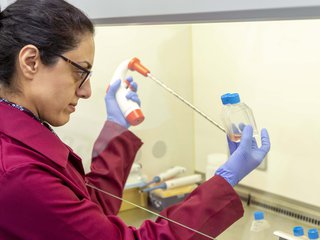Childhood blood cancer survival rates see big improvement
Improvements to blood cancer treatments mean an extra one in 10 children and young people now survives leukaemia and lymphoma compared to 20 years ago, according to a new analysis by our charity.
Our analysis, based on National Cancer Registration and Analysis Service data, shows that between 1997 and 2001, 79% of children and young people with blood cancer survived at least five years, but by 2012 to 2016, the survival rate had increased to 89%.
This means about 700 children and young people in the UK survived blood cancer between 2012 and 2016 who would not have done if they had been diagnosed in the late 1990s (about one in 10).
In 1997/2001, just 73% of 0 to 24-year-olds survived leukaemia, but by 2012/16 this had increased to 85%. For lymphoma, five-year survival for 0 to 24-year-olds has increased from 87% in 1997/2001 to 93% in 2012/16.
The improvement in survival rates is a result of scientific research over many years. Since our charity was founded in 1960 by a family who lost their six-year-old daughter to leukaemia, it has invested £500 million in blood cancer research and in that time survival for childhood leukaemia has improved from just one in 10 in 1960 to nine in 10 today.
Gemma Peters, Chief Executive of Blood Cancer UK, said: “The fact that more children than ever are surviving blood cancer is brilliant news, as it means fewer children robbed of their futures and fewer families enduring the devastation of losing a child.
“The way that scientific research has transformed survival rates for childhood blood cancer is one of the great scientific achievements of the last 50 years, and it has put us in a position where our dream of curing every child who gets leukaemia or lymphoma is now in sight. But any child dying in one too many, and it’s so important we continue to fund the research that will mean every child gets a cure.
“Our fear is that the pandemic will reduce these survival rates in the short term, and that its financial impact will have a longer-term effect on our ability to fund research. That is why we need to continue to raise the funds that will ensure the fight to beat childhood blood cancer is not set back by Covid.”
Sir Ian Botham, whose sponsored walks between the 1980s and 2000s raised millions of pounds for our charity, has welcomed the news. He said: “When I first started raising money for research into childhood blood cancer, many people thought the idea of a world where every child with leukaemia or lymphoma survives seemed an impossible dream. But I’ve always believed we could make it happen, and it is so gratifying to know that the thousands of miles walked by me and many others are part of the reason that today we’re so much closer to that dream.
“The millions of pounds my walks have raised is one of the proudest achievements of my life, and I’m proud to be part of the Blood Cancer UK family that has funded over £500 million of blood cancer research over the last 60 years. It’s a real pinch-yourself moment to think there are young men and women who are today getting a chance to live their life because of the research we helped fund, and it’s hugely humbling to have played a part in it.
“But while going from eight out of 10 surviving to nine out of 10 surviving is a historic achievement, it’s not enough. Right at the start of my walks, I said we were setting out to fund the research that would mean every child can be cured, and we’re not there yet. It’s so important we keep pushing on until we get there.”
Sylvia Gaunt is the sister of Susan Eastwood, whose parents, Hilda and David, set up our charity in 1960. She said: “It is such good news that the survival rate is continuing to improve, because it means fewer families are having to go through the pain that my family went through. It’s awe-inspiring that over the course of my lifetime, childhood leukaemia has gone from something that almost always fatal to a condition that most children now survive.
“Mum and Dad would be so proud to see how the charity they set up has helped make that change, but equally I’m very aware that we haven’t finished the job yet. It’s my hope that I live to see a world where no child at all dies of blood cancer.”
One of the key breakthroughs that has improved survival rates was Blood Cancer UK-funded scientists developing the minimal residual disease (MRD) test in the early 1990s, a landmark breakthrough that enabled doctors to detect tiny amounts of leukaemia cells, to make sure they were giving each child with leukaemia the right strength of treatment for their disease.

Because research will beat blood cancer
Over 60 years, we've invested more than £500 million in blood cancer research which has led to a long line of breakthroughs that have improved treatments and saved lives.
